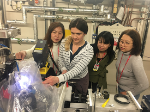____________________________________
Industrial Liaison Group:
Tel: +44 (0) 1235 778797
E-mail: industry@diamond.ac.uk
 The field of formulations is very broad and impacts many of the products and processes we use in everyday life, in fields as diverse as pharmaceuticals, oil, paints and coatings, cosmetics, food, and consumer products.
The field of formulations is very broad and impacts many of the products and processes we use in everyday life, in fields as diverse as pharmaceuticals, oil, paints and coatings, cosmetics, food, and consumer products.
Despite their widespread use, the complex nature of formulations means that their behaviour, function, and properties are often not well understood.
Diamond’s state-of-the-art analytical tools can help in the understanding of how different components affect formulations, changes in microstructure that occur with temperature, aging, or other external factors, and provide data to support intelligent formulation design.
Below are some examples of how Diamond's research techniques are applied.

Slip additives have been used extensively by many manufacturers to modify the surface structure of a wide range of materials. They work by reducing friction, but without compromising the material’s other properties. The use of slip additives extends across a multitude of industries - from food packaging and textiles, dyes, and lubricants, to hygiene products such as nappies.
Erucamide (13-cis-docosenamide, C22H43NO) is a common fatty acid amide slip additive. It functions well, even at low concentrations, and is stable and transparent with low toxicity. It is well known for its use in the manufacture of polymers such as polyethylene and polypropylene and has also been effective as an anti-fouling, anti-fogging, anti-viral, and scratch-resistant agent.
Read more...
Organic Friction Modifiers (OFMs) are surfactants included in engine oil formulations. They adsorb on metal surfaces, forming compact surface layers that act as protective coatings to reduce friction and wear occurring between mechanical engine parts.
The use of OFMs is associated with more energy-efficient engines and a reduction in CO2 emissions. The design of effective new formulations and novel OFMs relies on a detailed understanding of how OFMs self-assemble at interfaces and how their surface structure changes with tribological conditions.
Read more...
For many years, the skin care industry has been challenged with providing sun protection for its users whilst being environmentally friendly and both easy and safe to use.
Many existing products on the market use nanoparticles containing zinc oxide and titanium dioxide. These have been known to provide a transparent coating when used in formulations spread onto the skin’s surface. This transparency provides an aesthetically pleasing result, not achievable with larger-particle formulations. However, the potential for solid nanoparticles to penetrate and to diffuse into the body raises a considerable health and safety issue. There has therefore been a drive for research in this area, to develop alternative solutions.

The control of crystallisation is a perennial problem in many aspects of life – for example: the manufacturing of foodstuffs, polymer products, pharmaceuticals and the operation of transportation fuels. There has always been a wish to be able to change the nucleation and growth of crystallising species simply and efficiently. This would enable the control of wax crystals from diesel fuel, speed up polymer processing, and make pharmaceuticals and dairy products more efficiently.
Read more...
Poor air quality and reduced greenhouse gas emissions are at the forefront of public discussion, as well as being high on the agenda of worldwide policy makers. Many industries are embracing rapid changes in response, as is especially visible in the automotive sector, with the introduction of technologies such as gasoline particulate filters (GPFs). GPFs are positioned in a vehicle’s exhaust system and filter fine particulate matter (PM) produced by the engine. Recent legislation in places such as China, India and Europe will drive the adoption of GPFs on the majority of new gasoline, and hybrid electric, vehicles.
Whilst GPFs benefit public health and the environment by filtering out PM, they can also become gradually blocked by collected material. Captured carbonaceous particles (e.g. soot) can routinely oxidize away; however, inorganic PM (e.g. ash) typically remains in the filter for life, slowly blocking it and potentially reducing the fuel economy and power of the vehicle. Inorganic PM is predominantly derived from engine oil additive chemistry, which plays an important role in improving fuel economy, performance, and engine lifetime.
Read more...
The quality of ice cream is considered to depend on the size of constituent air cells and ice crystals, the smaller and rounder the better. Product quality and shelf life can be strongly affected by the temperature variations that can commonly occur during storage and distribution, including by the end consumer.
Read more...
Lung surfactant proteins are essential proteins found in the surfactant layer at the air-water interface of the lung. They provide the first line of defence for the body when exposed to ozone, present as a secondary pollutant in ambient air. It is known that ozone exposure can cause respiratory distress and can lead to increased hospital admissions and even death. The actual mechanism by which ozone disrupts the respiratory system is not well understood.
Read more...
Effective lubrication has a significant impact on a number of applications ranging from human artificial joint implants to energy efficiency of internal combustion engines and the reliability of offshore wind turbine gearboxes. At low running speeds and high contact pressures the fluid film cannot be maintained and therefore effective lubrication is greatly influenced by the presence of chemical additives in the lubricant. These additives interact with the lubricated surfaces to form nanoscale tribofilms that reduce both material wear and energy losses due to friction. Understanding the mechanisms by which these tribofilms form is essential for development and optimisation of the next generation environmentally friendly effective lubricants, materials and tribological systems.
Read more...Medicinal products extracted from biological sources, called biopharmaceuticals or biologics, must be carefully produced to ensure that only high purity active material is generated. Biopharmaceutical manufacturing processes can have an impact on the amount of product-related variants in the final clinical material. Understanding and controlling amounts of these product-related variants is a major challenge in the development of biopharmaceutical products.
Read more...
Hair care is a rapidly developing science. Consumers demand more from their products in terms of sensory perception and functionality. Rapid innovation into market is key to growth. Increased product complexity requires greater understanding of the interplay between components and an accurate description of the product microstructure and its rheological and dispersion properties are essential.
Read more...
The “freezing” of diesel fuel in winter has been a problem since its inception. Wax crystals nucleate and grow and block fuel lines and filters which can lead to vehicle failures and motorists being stranded. Additives are used to control these crystals but, over recent years, the use of biofuels (fatty acid methyl esters) within diesel blends has become increasingly common. This can adversely affect the low temperature operability of the fuel. Legislation demands that biofuels are part of diesel blends throughout the EU, with levels expected to increase.
Read more...
Only a very small proportion of the surfactant used in cleaning products is actually needed to provide the cleaning function. The majority of the surfactant used in formulations is added as a rheological modifier (thickener). Many surfactants are derived from petrochemicals so finding alternative and sustainable sources of ingredients with similar physicochemical properties is an important formulation challenge for consumer products manufacturers.
Read more...Diamond Light Source is the UK's national synchrotron science facility, located at the Harwell Science and Innovation Campus in Oxfordshire.
Copyright © 2022 Diamond Light Source
Diamond Light Source Ltd
Diamond House
Harwell Science & Innovation Campus
Didcot
Oxfordshire
OX11 0DE
Diamond Light Source® and the Diamond logo are registered trademarks of Diamond Light Source Ltd
Registered in England and Wales at Diamond House, Harwell Science and Innovation Campus, Didcot, Oxfordshire, OX11 0DE, United Kingdom. Company number: 4375679. VAT number: 287 461 957. Economic Operators Registration and Identification (EORI) number: GB287461957003.